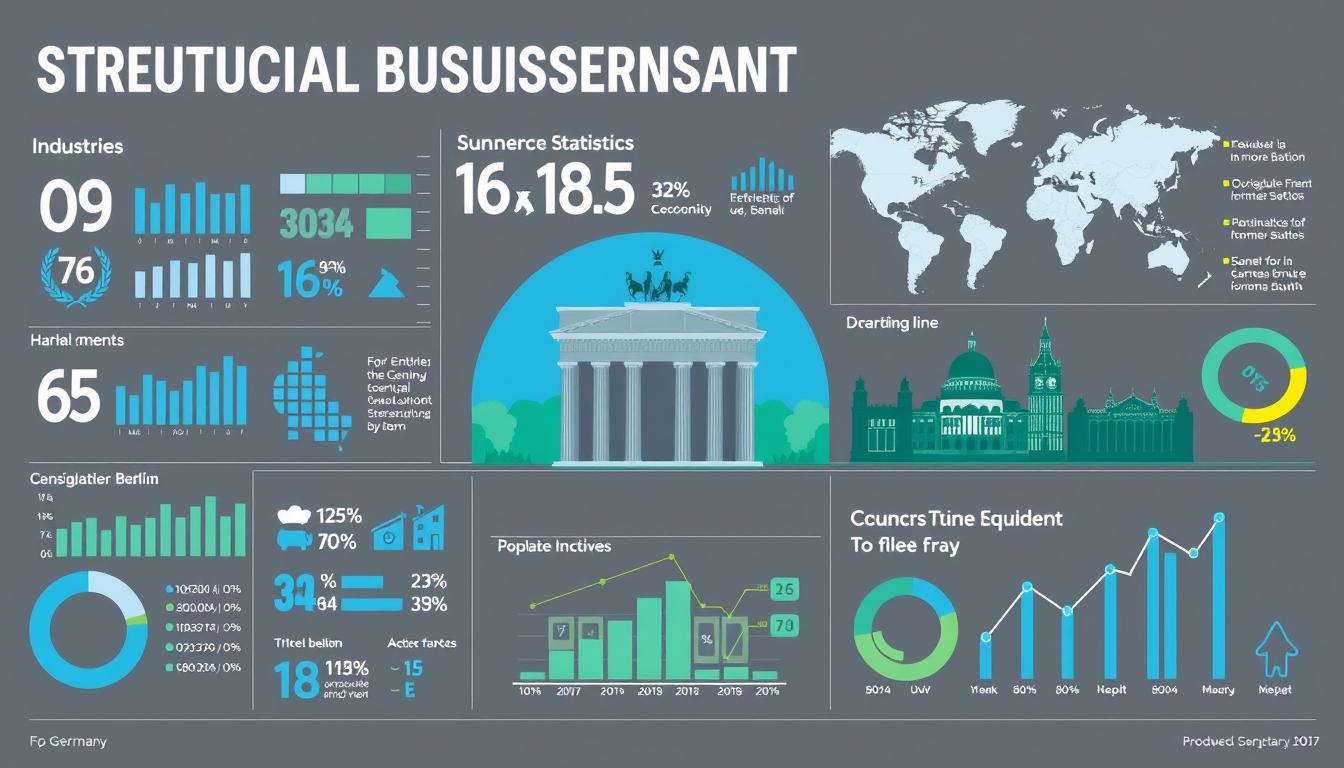Germany
Expanding your business internationally opens up many opportunities. Germany is a top choice for this. It has a strong economy and skilled workers, making it a great place to start.
- Understanding the German Market
- Legal Requirements for Conducting Business
- Choosing the Right Business Structure
- Navigating German Regulations
- Developing a Market Entry Strategy
- Building Local Partnerships
- Marketing Your Products Effectively
- Understanding the German Consumer
- Financial Considerations
- Choosing the Right Location
- Language and Communication
- Leveraging Technology for Growth
- Building a Brand in Germany
- Overcoming Common Challenges
- Establishing an Online Presence
- Evaluating Long-term Growth
- Conclusion and Next Steps
The German market is huge, with a spending power of about €2,000 billion. This makes it one of the biggest in Europe. Germany is also the fourth biggest economy worldwide.
Getting into the German market can give your business a big boost. It’s a stable and wealthy place to grow. With over 3.5 million companies, the market is competitive. A smart global business strategy is key to success.
Understanding the rules is important. About 50% of businesses find legal issues a big challenge. But, doing your homework can increase your chances of success by 65%.
If you want to grow in Germany, there’s a lot of help available.
Understanding the German Market
Expanding your business to Germany requires a deep dive into the market. You need to grasp the local business culture and the economic conditions. Knowing these well can boost your chances of success in this diverse market.
Cultural Insights
The German business culture values punctuality, precision, and formality. These values are key to building strong business relationships. About 60% of businesses found local partnerships vital for success.
Yet, around 40% faced cultural barriers. This shows the importance of cultural awareness. Working with local partners can offer valuable insights and ease your market entry.
Economic Landscape
Germany boasts a strong GDP growth rate and high consumer spending power. In 2022, its GDP growth was about 2.7%. This shows a healthy economy. German consumers had around €23,000 to spend per person in 2021.
The tech sector is growing fast, with a 5% annual increase. This makes it attractive for tech businesses. The e-commerce market is also booming, valued at about €100 billion in 2023.
But, there are challenges like regulatory hurdles. These were seen as major obstacles by 75% of businesses. The market is also highly competitive, with over 3.5 million SMEs making up 99.5% of all businesses.
Legal Requirements for Conducting Business
Thinking of starting a business in Germany? It’s vital to know the legal rules. This means understanding how to register your company and the tax rules in Germany.
Company Registration Process
Registering a company in Germany has several steps. First, you need to pick a business structure, like the GmbH. This is the most popular choice. It requires a minimum of €25,000 in capital, with €12,500 needed at the start.
For a corporation (AG), you need at least five people and €50,000 in stock.
The process also includes:
- Creating Articles of Association and Memorandum of Association, checked by the local trade office.
- Registering with the Office of Statistics, Labour Office, and Chamber of Commerce.
- Signing up with the Social Security Agency and Health Insurance Office.
- Telling the local Tax Office about your business within four weeks.
Businesses must follow Germany’s strict wage laws. Failing to do so can cost up to €500,000. Some businesses need special licences, like those for recruitment or real estate.
Tax Obligations
Understanding taxes in Germany is key. Sole traders and freelancers have different tax rules than companies. Freelancers don’t pay trade tax and don’t need to register with the business register. But, they must register with the tax office.
Companies, like GmbHs and AGs, face corporate tax, trade tax, and VAT. Knowing these taxes and how to follow the rules is important. Non-EU citizens often need a visa or work permit to do business in Germany. This adds more rules to follow.
In short, knowing German business law, how to register your company, and the tax rules is essential. This knowledge is the first step to a successful business in Germany.
Choosing the Right Business Structure
When you’re thinking about growing your business in Germany, picking the right structure is key. The choice between GmbH, AG, or sole proprietorship affects your liability, what you can do, and the rules you must follow. Let’s look at the main business types in Germany.
Limited Liability Company (GmbH)
The GmbH is a top pick for many entrepreneurs. You need at least €25,000 to start a GmbH. It protects your personal assets and works for all business sizes. But, setting up a GmbH takes time and costs a lot upfront.
Starting a GmbH shows you’re serious about the German market. With over 84 million people and a big economy, it’s a chance to grow your business.
Joint-Stock Company (AG)
The AG is for bigger companies. You need €50,000 to start. It’s good for growing fast because you can sell shares. But, there are strict rules to follow.
Germany has good work laws, like not working more than 48 hours a week. With 46.1 million people working, an AG can tap into a strong workforce.
Sole Proprietorships
For small businesses or solo entrepreneurs, a sole proprietorship is easy. It costs less to start and has fewer rules. But, you’re personally responsible for all debts, and taxes might be higher as profits grow.
This is good for starting small and working alone. The German market is full of chances, and a sole proprietorship can be a first step towards bigger things.
In short, choosing GmbH, AG, or sole proprietorship depends on your goals, money, and how much risk you can take. Think about what each offers to pick the best for your business in Germany.
Navigating German Regulations
Understanding German regulations is key for businesses wanting to set up in the country. Following these rules helps keep operations smooth and ensures compliance. Germany’s laws are strict, focusing on employment and health and safety.
Employment Laws
Germany’s employment laws aim to balance the rights of employers and employees. They cover fair pay, working hours, and how to fire staff. The “Arbeitszeitgesetz” (Working Hours Act) limits daily work to eight hours, with some exceptions.
Businesses must also respect collective bargaining agreements and employee rights. This includes giving workers a voice through works councils (“Betriebsrat”). These rules are part of the broader framework for employment in Germany. Businesses need to grasp and follow these laws.
For more help on moving to Germany for business and learning about local rules, check out this resource.
Health and Safety Standards
Germany’s health and safety rules are strict and enforced well to keep workplaces safe. The “Arbeitsschutzgesetz” (Occupational Safety and Health Act) requires employers to assess risks, provide safety gear, and train staff.
Businesses must also create safety plans and emergency response strategies. Authorities often check these plans to make sure they’re followed. Companies must stay on top of these rules to protect their workers and avoid fines.
Germany’s strict laws and skilled workforce make it a great place for businesses to grow. By following employment and health and safety regulations, companies can build a solid base in Europe’s biggest economy.
Developing a Market Entry Strategy
When planning to enter the German market, it’s key to use a SWOT analysis and competitive analysis. These tools help us grasp the business environment and create a solid strategy. Germany is a great place for entrepreneurs, with its strong economy and many opportunities.
SWOT Analysis
A SWOT analysis business gives us insights into our strengths, weaknesses, opportunities, and threats. For example:
- Strengths: Germany’s skilled workforce and innovative climate.
- Weaknesses: High living costs and complex regulations.
- Opportunities: Growing sectors like AI and green energy.
- Threats: Economic ups and downs and global tensions.
By analysing these, we can see what sets us apart and what needs work. It’s also important to think about how external factors, like Donald Trump’s tariff increase, affect trade.
Competitive Analysis
Knowing the competitive landscape in Germany is essential for any market entry plan. Companies like Apple and Tesla show the need for customised strategies. Tesla started by exporting cars from the U.S. and later built local factories. Starbucks began by licensing in China, then took full ownership to reduce risks.
Doing a deep competitive analysis means looking at local rivals, market changes due to supply chain issues, and global economic shifts. European stock markets have seen big drops, impacting businesses and investments. This helps us fine-tune our strategies and find unique selling points for growth.
Building Local Partnerships
Expanding into Germany can be smoother with strong business partnerships Germany. Working with local distributors and joining business networks gives valuable insights. It’s key to do thorough market research to know what locals want and who you’re up against.
Finding Distributors
Finding the right finding distributors Germany is a big step. The Enterprise Europe Network (EEN) helps by connecting over 600 members and 3,000 experts. It helps UK businesses find partners in the EU, making it easier to get into Germany’s market.
Networking Opportunities
Going to business events is a smart move for business partnerships Germany. It helps you meet people and learn about the market. The EEN, started in 2008, is a big help for SMEs wanting to grow internationally. It links businesses in over 65 countries, including Germany.
By getting involved in business networking Germany and making alliances, you can overcome entry hurdles. This approach helps you run your business better and grow your market share. It’s all about having a solid plan for entering the German market.
Marketing Your Products Effectively
To market products well in Germany, you need to know what locals like and use digital marketing smartly. It’s key to adjust your marketing to fit this special market to succeed.
Adapting to Local Preferences
Understanding German consumer habits is vital. The e-commerce in Germany is big, set to hit $116,574.3 million by 2025. Fashion, hobbies, and electronics are the top sellers.
Brands should match their products to what Germans like. Germans want clear product info and good photos. Also, easy returns and delivery options make customers happy. Deutsche Post DHL moved 1.73 billion packages in 2023, showing the need for good logistics.
Digital Marketing Strategies
Digital marketing is key to grab German shoppers’ attention. The digital market in Germany is growing fast, with a 4.1% CAGR from 2025 to 2029. It’s expected to reach $136,826.8 million by 2029.
Good marketing in Germany means improving SEO, using social media, and targeted ads. Using Amazon.de and digital wallets can help reach more customers. Also, making online payments easy is important, as 66% of transactions are online.
When entering the market, localising your digital marketing is essential. Making content fit the local language and culture boosts engagement and loyalty in the competitive German market.
Understanding the German Consumer
Knowing what German consumers want is key for businesses to thrive. It’s important to understand their behaviour and find out who they are. This helps in creating products and services that meet their needs.
Consumer Behaviour Trends
The latest GfK Consumer Climate survey shows a drop in consumer mood. The mood for March 2025 fell by 2.1 points to -24.7 points. This shows Germans are worried about the economy.
People are now more cautious with their money. They are saving more and spending less. This change is due to economic worries.
About 30% of what Germans spend goes on shopping. The rest goes on services, travel, and other important things. This shows how varied German spending is.
Market Segmentation
Segmenting the market in Germany means grouping people based on who they are and what they do. This helps businesses make products and ads that fit what different groups want.
Some Germans like high-end products, but others are more careful with their money. Different parts of Germany have different cultures. This means businesses need to tailor their approach for each area.
Some industries, like online shopping and finance, do well with a local touch. Germans value clear and direct communication. They don’t like too much small talk in business talks.
In summary, understanding German consumers and segmenting the market is vital. It helps businesses build a strong presence and succeed in the long run.
Financial Considerations
Expanding a business to Germany comes with financial aspects to consider. The cost of living, wages, and investment incentives are key. These factors affect the overall cost of doing business in Germany.
Cost of Living and Wages
The cost of living in Germany changes by city. Cities like Berlin, Munich, and Frankfurt have higher costs than smaller towns. For businesses, knowing the wage structures is important.
The unemployment rate in 2024 was 3.4%, with a forecast of 3.2% in the medium term. This shows stable job conditions. Real compensation grew by 2.3% in Q2 2024, showing a rise in employee earnings. These trends impact both business costs and employee spending.
Investment Incentives
Germany has many incentives for business growth. These include subsidies, tax breaks, and funding options. For example, the Ministry of Finance allows partial deduction of interest expenses under certain conditions.
Investment grade ratings help set interest rates for debt tests. Financing for dividends is also supported if it follows typical policies. These rules help reduce the cost of doing business in Germany.
There are also benefits in the industrial and service sectors. The industrial sector makes up 26.8% of GDP, and the service sector is 63.7%. Knowing these economic conditions and using available incentives can boost profits and efficiency.
Choosing the Right Location
Choosing the right business location in Germany is key for success. Germany’s central Europe spot, strong infrastructure, and advanced logistics help businesses run smoothly. Knowing these points can help you make a better choice for expanding.
Key Business Hubs
Germany has many business hubs, each with its own benefits. Berlin, Munich, and Frankfurt are top spots for business. Berlin is great for startups and tech, Munich for finance and engineering, and Frankfurt for finance.
Where you choose to set up in Germany matters a lot. It depends on your industry and what you need for growth.
Infrastructure and Logistics
The infrastructure business in Germany is top-notch. It has great transport links like rail, highways, and airports. This helps companies manage their logistics well.
A strong infrastructure means better connectivity. It makes it easier to move goods around. This makes Germany a great choice for businesses looking to grow.
The logistics German market is known for being efficient. Cities and industrial zones are well-planned. This cuts down on transport costs and improves supply chain management.
Investing in a good market entry strategy is key. It helps businesses fit into Germany’s fast-paced economy. Using local resources and partnerships is important for success.
Also, think about the environment and competition. Doing a deep market analysis is vital. It helps businesses understand their customers’ spending power and plan for the future.
By understanding logistics and infrastructure, companies can do well in Europe’s biggest market.
Language and Communication
To succeed in Germany, you need to know the German language and how businesses communicate. Speaking the language helps you build strong ties with local partners and clients. It’s also key to understand the local business etiquette to thrive in this competitive market.
Importance of Language Skills
Knowing German is essential in the business world. Clear communication is vital for success. For example, 65% of companies look for employees who speak both English and German.
Language barriers can cost businesses a quarter of their opportunities. Teams that communicate well are 25% more productive. This shows how important good communication is in Germany.
Navigating Business Etiquette
Knowing how to act in a German business setting is just as important. Germans value formality, being on time, and detailed discussions. Following proper etiquette helps build trust and strong professional relationships.
Germany is a big player in the global market. It supports around 5 million jobs in the EU. This shows its importance in international trade.
Leveraging Technology for Growth
Using advanced technology is key for businesses wanting to grow in Germany. It helps them find new ways to work better and reach more customers. This leads to more growth.
E-commerce Opportunities
Expanding your business means tapping into the e-commerce market Germany offers. With global e-commerce sales set to hit $6.4 trillion by 2024, the growth is huge. Companies using e-commerce for international sales can see a 25% increase in revenue in just one year.
By using technology, businesses can connect better with their customers. They can use digital marketing that fits local tastes. This helps them grow.
Digital Transformation
Germany’s digital transformation offers big chances for growth. Using digital payments, like those from India and Indonesia, can make money easier to manage. It can also help businesses grow by 40-60% in profit.
Germany is a leader in making things precisely and innovating in engineering. Businesses need to keep up with the latest technology. This way, they can stay ahead and keep growing in the competitive German market.
Building a Brand in Germany
To build a strong brand in Germany, you need a detailed plan. This plan should include creating a unique value proposition and managing your brand’s reputation. These steps help make your brand memorable and build trust with customers, which is key for lasting success.
Crafting a Unique Value Proposition
When creating a value proposition in Germany, you must show what makes your brand different. A good value proposition tells customers why they should choose your brand over others. This is vital in Germany, where being seen on Google.de matters a lot.
Personalised emails are a great way to connect with German consumers. About 60% of them respond well to such emails, making them a powerful tool for sharing your value.
Brand Reputation Management
Managing your brand’s reputation in Germany is an ongoing task. It’s important to engage with customers through ads on Facebook and LinkedIn. Facebook has a 30% user base, and LinkedIn is top for B2B marketing with over 16 million users in Germany.
Also, taking part in Germany’s many trade fairs can boost your brand’s visibility. Influencer marketing can increase brand awareness by up to 11 times if done right. Personalised experiences and omnichannel strategies help keep your reputation positive.
Improving your brand management in Germany means focusing on quality interactions and consistent communication. Using data and understanding local tastes helps create a trusted brand experience.
Overcoming Common Challenges
Starting a business in Germany comes with its own set of challenges. To succeed, you need to tackle regulatory compliance and cultural adaptation head-on.
Regulatory Hurdles
In Germany, following the rules is key to a business’s success. The country has strict laws on GDPR, taxes, employment, and the environment. For example, getting a tax number can take months, which might slow down your start-up.
It’s also important to know about double taxation agreements and their impact on your finances. Plus, keeping up with GDPR for data protection and PCI DSS for payment security is a must.
Cultural Differences
Adapting to the local culture is vital for success in Germany. You need to grasp local customs, consumer habits, and how people communicate. For instance, the German workforce values professionalism and punctuality.
Also, with many countries not speaking English, language barriers can be a big challenge. Investing in language training and hiring local staff can help. Understanding the culture can give you a competitive edge in this market.
Establishing an Online Presence
Expanding an online business in Germany needs a strong digital presence. With 70% of consumers checking a brand online before buying, a local website and smart social media are essential. Germany’s internet users reach 78 million daily, making it vital for businesses.
Setting Up a Local Website
A local website is the base of a successful online business in Germany. The German market values user-friendly, mobile-optimised sites. With 54% of global website traffic from mobiles, a fast, responsive site can boost revenue by 20-30%.
Using local hosting services can also improve your site’s speed and reliability. This enhances the user experience. It’s important to include local language and culturally relevant content on your site. Tailoring your design and content to local tastes can increase engagement by 61%.
Integrating local payment systems makes transactions smooth for German users. This is key for a good user experience.
Social Media Strategies
Social media marketing is also critical in Germany. Businesses that engage with their audience on social media see a 20-40% increase in loyalty. This is vital for success. 90% of marketers see social media as essential for their business.
Crafting content that resonates with local audiences is key. Use platforms like Facebook, Instagram, and LinkedIn, which are popular in Germany. High engagement on these platforms signals market readiness and guides strategic decisions.
Targeting specific demographics and interests can boost visibility. With 56.9% of Germans researching products online, engaging social media content can drive traffic to your site. Creating posts around trending topics and cultural events can capture local interest and build a brand community.
Combining a strong online presence with a local website and smart social media strategies will solidify your position in the German market. Digital engagement is essential for success in today’s world.
Evaluating Long-term Growth
Understanding emerging market trends in Germany and adopting sustainable practices is key. This approach keeps your business ahead in a changing world. It sets the stage for sustainable growth in Germany.
Trends Affecting Future Growth
Spotting and using market trends in Germany is vital for lasting success. Businesses must keep up with what customers want, new tech, and economic changes. Eco-friendly products and digital changes are big growth drivers.
Strategies for Sustainability
Going green not only helps the planet but also makes your brand more appealing. To grow in Germany, cut down on carbon, use renewable energy, and follow circular economy ideas. Also, a team that works well together and happy employees lead to better results and success over time.
Conclusion and Next Steps
As we wrap up our look at expanding your business to Germany, it’s key to sum up the main strategies. Understanding the German market, following legal rules, and picking the right business setup are all important. Germany’s strong economy and large market make it a great place for growth.
Recap of Key Points
First, knowing Germany’s culture and economy is essential. The country’s focus on tech, AI, and manufacturing offers big chances. You must also follow legal steps like registering your company and paying taxes.
Choosing the right business type, like a GmbH or AG, fits your goals and meets rules. Marketing well and making local partnerships are also key. Adapting to local tastes and using digital marketing can boost your presence.
Knowing the German consumer and doing a competitive analysis are important. A strong market entry plan and understanding costs help shape your strategy.
Action Plan for Expansion
To make these ideas real, you need a clear plan for growing your business. Begin with a SWOT analysis to spot your strengths and weaknesses. Join local networks to find partners and distributors.
Having a strong online presence through a local website and social media is vital. Use new tech, like e-commerce, to improve your operations. Invest in your brand and understand customer trends. Overcoming challenges like rules and cultural differences is key to success.

Pros and Cons of Expanding Your Business to Germany
Explore the advantages and challenges of growing your enterprise with our guide on the pros and cons of expanding your business to Germany.

Structural business statistics in Germany
In this article, we look at Structural Business Statistics (SBS) in Germany. It’s a key tool for understanding the country’s ...

Branch or Subsidiary: Starting a Business in Germany
Starting a business in Germany requires a big decision. Do we set up a branch or a subsidiary? Each choice ...

Relocating to Germany for business
Explore essential tips and opportunities for successfully relocating to Germany for business, ensuring a smooth transition into the market.

Lucrative Business Ventures to Launch in Germany
Explore top business ideas to start in Germany and tap into a market ripe for innovative entrepreneurs seeking success.

Navigating Business Banking in Germany for UK Firms
Explore essential tips for UK firms on navigating business banking in Germany with ease and efficiency. Get started today.

Understanding Business Culture in Germany
Explore the nuances of engaging with Business culture in Germany and navigate corporate interactions with confidence.

Doing Business in Germany: A Comprehensive Guide
Unlock the secrets of Doing Business in Germany with our expert tips and strategies for success in the European market.








